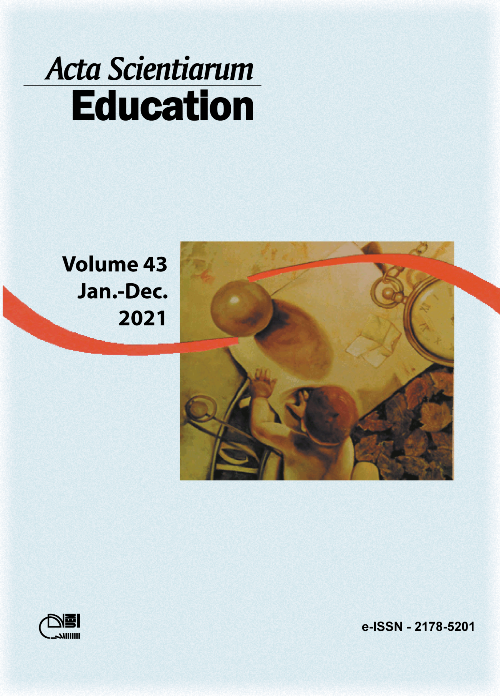El panorama de los estudios que se centran en el papel de los intelectuales negros en las producciones científicas en el ámbito de la Educación (2010-2019)
Chamada Temática: "Gestão e Trabalho Pedagógico na Educação Básica e suas Interfaces com a Formação dos Profissionais da Educação"
Resumen
Este trabajo indagó en el panorama de estudios que se enfocan en el rol de los intelectuales negros en las producciones científicas en el campo de la Educación, evaluados como los de mayor impacto global por una de las principales instituciones para la promoción y seguimiento de la producción científica brasileña. En concreto, este estudio tuvo como objetivo: comprender el alcance del tema en los principales vehículos de divulgación científica; analizar el abordaje de este tema en los estudios publicados en estos espacios de socialización del conocimiento; y evaluar posibles tendencias y vacíos teóricos en este campo de investigación para escenarios prospectivos. Desde un punto de vista metodológico, consiste en una revisión cualitativa y sistemática de la literatura. Para ello, se utilizaron como bases de datos revistas evaluadas en el área de Educación por la Coordinación de Perfeccionamiento del Personal de Educación Superior (Capes), con estrato A1, en el ámbito de la evaluación cuatrienal 2013-2016. Uno a uno, todos los números de las 69 revistas listadas con el estrato A1 fueron consultados en el portal Capes Web Qualis. Como resultado, se encontró que solo 11 revistas habían socializado algún estudio centrado en el tema de esta investigación. A lo largo de los números publicados por estas 11 revistas, fue posible encontrar 18 estudios que arrojan luz sobre los aportes de las mujeres negras al campo de la Educación. A partir del recurso analítico de la revisión sistemática de la literatura, se pudo constatar que el racismo y el machismo son estructurales dentro de la sociedad capitalista y que este es un campo de investigación latente, ya sea a nivel nacional o internacional.
Descargas
Citas
Almeida, S. L. (2018). O que é racismo estrutural? Belo Horizonte, MG: Letramento.
Almeida, S. L. (2019). Racismo estrutural. São Paulo, SP: Pólen Livros.
Alvarez, S. E. (2012). Feminismos e antirracismo: entraves e intersecções: Entrevista com Luiza Bairros, ministra da Secretaria de Políticas de Promoção da Igualdade Racial (Seppir). Revista Estudos Feministas, 20(3), 833-850. DOI: http://dx.doi.org/10.1590/S0104-026X2012000300012
Benite, A. M. C., Bastos, M. A., Vargas, R. N., Fernandes, F. S., & Faustino, G. A. A. (2018). Cultura africana e afro-brasileira e o ensino de química: estudos sobre desigualdades de raça e gênero e a produção científica. Educação em Revista, 34. DOI: http://dx.doi.org/10.1590/0102-4698193098
Bersani, H. (2017). Racismo estrutural e o direito à educação. Educação em Perspectiva, 8(3), 380-397. DOI: https://doi.org/10.22294/eduper/ppge/ufv.v8i3.892
Bonelli, M. G. (2017). Docência do direito: fragmentação institucional, gênero e interseccionalidade. Cadernos de Pesquisa, 47(163), 94-120. DOI: http://dx.doi.org/10.1590/198053143659
Butler, A. (2019). Quiltmaking among African-American women as a pedagogy of care, empowerment, and sisterhood. Gender and Education, 31(5), 590-603. DOI: https://doi.org/10.1080/09540253.2019.1594708
Campos, P. F. S. (2013). Memorial de Maria de Lourdes Almeida: história e enfermagem no Brasil pós-1930. História, Ciências, Saúde-Manguinhos, 20(2), 609-625. DOI: http://dx.doi.org/10.1590/S0104-59702013000200014
Campos, P. F. D. S., & Carrijo, A. R. (2019). Ilustre inominada: Lydia das Dôres Matta e enfermagem brasileira pós-1930. História, Ciências, Saúde-Manguinhos, 26, 165-185.
Carapanã. (2018). A nova direita e a normalização do nazismo e do fascismo. In E. S. Gallego (Org.), O ódio como política: a reinvenção da direita no Brasil (p. 33-40). São Paulo, SP: Boitempo.
Cardoso, C. P. (2014). Amefricanizando o feminismo: o pensamento de Lélia Gonzalez. Revista Estudos Feministas, 22(3), 965-986. DOI: http://dx.doi.org/10.1590/S0104-026X2014000300015
Casimiro, F. H. (2018). As classes dominantes e a nova direita no Brasil contemporâneo. In E. S. Gallego (Org.), O ódio como política: a reinvenção da direita no Brasil (p. 41-46). São Paulo, SP: Boitempo.
Cerqueira, D., Lima, R. S., Bueno, S., Neme, C., Ferreira, H., Coelho, D., ... Marques, D. (2018). Atlas da violência 2018. Rio de Janeiro, RJ: Ipea e FBSP.
Chassot, A. (2004). A ciência é masculina? É, sim senhora!... Revista Contexto & Educação, 19(71-72), 9-28. DOI: https://doi.org/10.21527/2179-1309.2004.71-72.9-28
Chetcuti, D. A., & Kioko, B. (2012). Girls’ attitudes towards science in Kenya. International Journal of Science Education, 34(10), 1571-1589. DOI: https://doi.org/10.1080/09500693.2012.665196
Conselho Nacional de Desenvolvimento Científico e Tecnológico [CNPq]. (2015). Parte II - As negras e os negros nas bolsas de formação e de pesquisa do CNPq. Recuperado de https://docplayer.com.br/19915057-Parte-ii-as-negras-e-os-negros-nas-bolsas-de-formacao-e-de-pesquisa-do-cnpq.html
Conselho Nacional de Desenvolvimento Científico e Tecnológico [CNPq]. (2019). Quantitativos de bolsas: por sexo. Recuperado de http://memoria.cnpq.br/documents/10157/a52cb305-e19e-49c1-b312-50b2181a7213
Crisostomo, M. A. S., & Reigota, M. A. S. (2010). Professoras universitárias negras: trajetórias e narrativas. Avaliação: Revista da Avaliação da Educação Superior (Campinas), 15(2), 93-106. DOI: http://dx.doi.org/10.1590/S1414-40772010000200005
Cruz, A. C. J. (2018). Protagonismo do pensamento negro no Brasil: o lugar das mulheres e crianças negras no Projeto Unesco. Educação em Revista, 34. DOI: http://dx.doi.org/10.1590/0102-4698191259
Davis, A. (2011). As mulheres negras na construção de uma nova utopia. Portal Geledés. Recuperado de https://www.geledes.org.br/as-mulheres-negras-na-construcao-de-uma-nova-utopia-angela-davis/
Davis, A. (2016). Mulheres, raça e classe. São Paulo, SP: Boitempo.
Dias, A. F., Silva, I. P., & Rios, P. P. S. (2020). Os estudos de gênero em revistas científicas do FEPAE-NN: uma revisão sistematizada. Revista Exitus, 10, e020039-e020039. DOI: https://doi.org/10.24065/2237-9460.2020v10n0ID1287
Eriksen, I. M. (2019). Tough femininities: ethnic minority girls’ aggressive school opposition. British Journal of Sociology of Education, 40(8), 1090-1104. DOI: https://doi.org/10.1080/01425692.2019.1646113
Ferreira, L. (2018). Menos de 3% entre docentes da pós-graduação, doutoras negras desafiam racismo na academia. Gênero e Número. Recuperado de http://www.generonumero.media/menos-de-3-entre-docentes-doutoras-negras-desafiam-racismo-na-academia/
Hirshfield, L. E., & Joseph, T. D. (2012). ‘We need a woman, we need a black woman’: Gender, race, and identity taxation in the academy. Gender and Education, 24(2), 213-227. DOI: https://doi.org/10.1080/09540253.2011.606208
Hooks, B. (2013). Ensinando a transgredir: a educação como prática da liberdade. São Paulo, SP: WMF Martins Fontes.
Instituto Brasileiro de Geografia e Estatística [IBGE]. (2015). Cor ou raça. Recuperado de https://educa.ibge.gov.br/jovens/conheca-o-brasil/populacao/18319-cor-ou-raca.html
Instituto Brasileiro de Geografia e Estatística [IBGE]. (2018). Quantidade de homens e mulheres. Recuperado de https://educa.ibge.gov.br/jovens/conheca-o-brasil/populacao/18320-quantidade-de-homens-e-mulheres.html
Lange, N., Mitchell, C., & Bhana, D. (2012). Voices of women teachers about gender inequalities and gender-based violence in rural South Africa. Gender and Education, 24(5), 499-514. DOI: https://doi.org/10.1080/09540253.2011.645022
Leach, F. (2012). Resisting conformity: Anglican mission women and the schooling of girls in early nineteenth-century West Africa. History of Education, 41(2), 133-153. DOI: https://doi.org/10.1080/0046760X.2011.582048
Longaray, D. A., & Ribeiro, P. R. C. (2015). Gêneros e sexualidades nos espaços educativos: estratégias de enfrentamento à homofobia. Revista Educação e Políticas em Debate, 4(2).
Louro, G. L. (2003). Gênero, sexualidade e educação: uma perspectiva pós-estruturalista. Petrópolis, RJ: Vozes.
Massarani, L., & Lima, L. (2012). Brasil-Moçambique, laços na política científica: entrevista com Lídia Brito. História, Ciências, Saúde-Manguinhos, 19(2), 533-540. DOI: http://dx.doi.org/10.1590/S0104-59702012000200010
Miguel, L. F. (2018). A reemergência da direita brasileira. In E. S. Gallego (Org.), O ódio como política: a reinvenção da direita no Brasil (p. 17-26). São Paulo, SP: Boitempo.
Nunes, E. T., Silva, I. P., & Mercado, L. P. L. (2016). Levantamento dos temas TIC e EAD nos periódicos qualis. Informática na Educação: Teoria & Prática, 19(3). DOI: https://doi.org/10.22456/1982-1654.62116
Plataforma Sucupira. (2020). Recuperado de https://sucupira.capes.gov.br/sucupira/public/consultas/coleta/veiculoPublicacaoQualis/listaConsultaGeralPeriodicos.jsf
Ramos, A., Faria, P. M., & Faria, Á. (2014). Revisão sistemática de literatura: contributo para a inovação na investigação em Ciências da Educação. Revista Diálogo Educacional, 14(41), 17-36. DOI: http://dx.doi.org/10.7213/dialogo.educ.14.041.DS01
Reznik, G., Massarani, L, Ramalho, M., & Amorim, L. (2014). Ciência na televisão pública: uma análise do telejornal Repórter Brasil. Alexandria: Revista de Educação em Ciência e Tecnologia, 7(1), 157-178. Recuperado de https://periodicos.ufsc.br/index.php/alexandria/article/view/38182
Santos, E. S. (2018). O legado de Virgínia Leone Bicudo para a sociologia da infância no Brasil. Cadernos de Pesquisa, 48(170), 1194-1217. DOI: http://dx.doi.org/10.1590/198053146009
Segura Muñoz, S. I., Takayanagui, A. M. M., Santos, C. B. D., & Sanchez-Sweatman, O. (2002). Revisão sistemática de literatura e metanálise: noções básicas sobre seu desenho, interpretação e aplicação na área da saúde. In Proceedings of the 8th Brazilian Nursing Communication Symposium. São Paulo, SP: Sibracen. Recovered from http://www.proceedings.scielo.br/scielo.php?script=sci_arttext&pid=MSC0000000052002000200010&lng=en&nrm=van
Silva, I. P. D. (2018). Em busca de significados para a expressão “ideologia de gênero”. Educação em Revista, 34. DOI: http://dx.doi.org/10.1590/0102-4698190810
Silva, I. P. D., & Mercado, L. P. L. (2015). Levantamento dos temas TIC e EAD na biblioteca virtual Educ@. Cadernos de Pesquisa, 45(158), 970-988. DOI: http://dx.doi.org/10.1590/198053143367
Silva, J. D., & Euclides, M. S. (2018). Falando de gênero, raça e educação: trajetórias de professoras doutoras negras de universidades públicas dos estados do Ceará e do Rio de Janeiro (Brasil). Educar em Revista, 34(70), 51-66. DOI: http://dx.doi.org/10.1590/0104-4060.58760
Silva, I. P., Dias, A. F., & Rios, P. P. S. (2020a). Os estudos de gênero na Revista Tempos e Espaços em Educação: uma revisão sistematizada. Educação & Formação, 5(14). DOI: https://doi.org/10.25053/redufor.v5i14mai/ago.2495
Silva, S. M. P., Maciel, V. V., & França, M. H. O. (2020b). Conservadorismo como instrumento capitalista em tempos de barbárie. Revista Katálysis, 23(2), 256-265. DOI: http://dx.doi.org/10.1590/1982-02592020v23n2p256
Stockfelt, S. (2018). We the minority-of-minorities: a narrative inquiry of black female academics in the United Kingdom. British Journal of Sociology of Education, 39(7), 1012-1029. DOI: https://doi.org/10.1080/01425692.2018.1454297
Teles, E. (2018). A produção do inimigo e a insistência do Brasil violento e de exceção. In E. S. Gallego (Org.), O ódio como política: a reinvenção da direita no Brasil (p. 65-72). São Paulo, SP: Boitempo.
West, N. M. (2019). In the company of my sister-colleagues: Professional counterspaces for African American women student affairs administrators. Gender and Education, 31(4), 543-559. DOI: https://doi.org/10.1080/09540253.2018.1533926

This work is licensed under a Creative Commons Attribution 4.0 International License.
DECLARACIÓN DE ORIGINALIDAD Y DERECHOS DE AUTOR
Declaro que este artículo es original y no ha sido presentado para publicación en ninguna otra revista nacional o internacional, ni en parte ni en su totalidad.
Los derechos de autor pertenecen exclusivamente a los autores. Los derechos de licencia utilizados por el periódico son la licencia Creative Commons Attribution 4.0 (CC BY 4.0): por lo tanto, se permite compartir (copiar y distribuir el material en cualquier medio o formato) y adaptar (remezclar, transformar y crear material a partir del contenido). licencia para cualquier propósito, incluidos fines comerciales).
Se recomienda leer este enlace para obtener más información sobre el tema: proporcionar créditos y referencias correctamente, entre otros detalles cruciales para el buen uso del material licenciado.













































